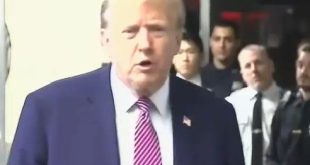Funding for the military has emerged as a key sticking point in reaching an agreement to raise the nation’s borrowing limit and prevent a catastrophic default, with Republicans pushing to spare the Defense Department from spending caps and make deeper cuts to domestic programs like education.
President Biden has balked at that demand, pointing to a long series of past budget agreements that either cut or increased military spending in tandem with discretionary programs outside of defense.
How the sides resolve that issue will be critical for the final outcome of any debt deal. It remains possible that in order to reach a deal that prevents a default, Democrats will accept an agreement that allows military spending to grow even as nondefense spending falls or stays flat.
Mr. Biden’s aides and congressional Republicans deputized by Speaker Kevin McCarthy are trying to negotiate an agreement to lift the borrowing limit before the government runs out of money to pay its bills on time, which could be as soon as June 1. Republicans have refused to raise the limit unless Mr. Biden agrees to cuts in federal spending outside of the military.
The talks over spending cuts have narrowed in focus to mostly cover a relatively small corner of the budget — what is known as discretionary spending. That spending is split into two parts. One is money for the military, which the Congressional Budget Office estimates will total $792 billion for the current fiscal year. The other half funds a wide range of domestic programs, like Head Start preschool and college Pell Grants, and federal agencies like the Interior and Energy Departments. It will total $919 billion this year, the budget office estimates.
A separate category known as mandatory spending has largely been deemed off limits in the talks. That spending, which is the primary driver of future spending growth, includes programs like Social Security and Medicare.
Administration officials have proposed freezing both halves of discretionary spending for next year. That would amount to a budget cut, compared with projected spending, under the way the budget office accounts for spending levels. Spending for both parts of the discretionary budget would be allowed to grow at just 1 percent for the 2025 fiscal year. That could also amount to a budget cut since 1 percent would almost certainly be less than the rate of inflation. That proposal would save about $1 trillion over the span of a decade, compared with current budget office forecasts.
Republicans rejected that plan at the bargaining table. They are pushing to cut nondefense spending in actual terms — meaning, spend fewer dollars on it next year than the government spent this year. They also want to allow military spending to continue to grow.
“It just sends a bad message and Republicans feel like it would not be in our best interest to cut spending at this juncture, when you’re looking at China and Russia and a lot of instability around the world,” said Representative Robert B. Aderholt, Republican of Alabama, who sits on an Appropriations panel that oversees Pentagon spending. “That’s been the basic position that most Republicans have.”
Mr. McCarthy sounded a similar note when speaking to reporters on Thursday. “Look, we’re always looking where we could find savings and others, but we live in a very dangerous world,” he said. He added, “I think the Pentagon has to actually have more resources.”
Republicans included 10-year caps on discretionary spending in a bill they passed last month that also raised the debt ceiling through next year, and party leaders said they would exempt the military from those caps. Mr. Biden has vowed to veto the bill if it passes the Senate in its current form, which is unlikely.
White House officials have hammered Republicans over concentrating their proposed discretionary savings on domestic programs, saying their bill would gut spending on border enforcement, some veterans’ care, Meals on Wheels for older Americans and a host of other popular programs.
“Speaker McCarthy and I have a very different view of who should bear the burden of additional efforts to get our fiscal house in order,” Mr. Biden said on Thursday at the White House. “I don’t believe the whole burden should fall on the backs of the middle class and working-class Americans.”
Congressional Democrats, including members of committees that oversee military spending, have attacked Republicans for focusing largely on nondefense programs.
“If you’re going to freeze discretionary spending, there’s no reason on earth why defense shouldn’t be part of that conversation,” said Representative Adam Smith of Washington, the top Democrat on the Armed Services Committee. Republicans, he said, “are taking a hostage to advance their very narrow agenda. I’m not a fan of that. That’s not something I’m going to want to support.”
Any agreement that increased military spending while freezing or cutting other discretionary spending would break from a budget-deal tradition that dates to 2011, when House Republicans refused to raise the debt limit until President Barack Obama agreed to spending cuts. The deal that avoided default was centered on spending caps that split their reductions evenly between defense and nondefense programs.
The push to increase military funding while cutting more heavily elsewhere reflects a divide in the House Republican caucus. It includes a large faction of defense hawks who say the military budget is too small, alongside another large faction of spending hawks who want to significantly shrink the fiscal footprint of the federal government.
Mr. McCarthy needs both factions to retain his hold on the speakership, which he narrowly won this year after a marathon week of efforts to secure the votes. And he will need to navigate them both as he tries to pass any debt-limit agreement with Mr. Biden through the House.
Catie Edmondson contributed reporting.
 Top Naija News: Nigerian News, Breaking News Nigeria and World News Top Naija News is a daily news publication in Nigeria, delivering the latest breaking news in Nigeria and around the world.
Top Naija News: Nigerian News, Breaking News Nigeria and World News Top Naija News is a daily news publication in Nigeria, delivering the latest breaking news in Nigeria and around the world.




